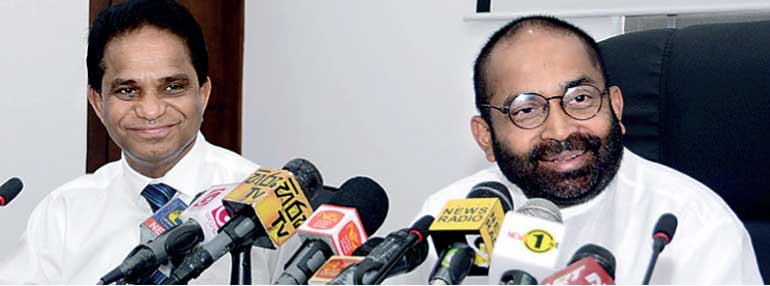Thursday Feb 19, 2026
Thursday Feb 19, 2026
Friday, 22 July 2016 00:12 - - {{hitsCtrl.values.hits}}
 Power and Renewable Energy Minister Ranjith Siyambalapitiya (right) - Pic by Pradeep Pathirana
Power and Renewable Energy Minister Ranjith Siyambalapitiya (right) - Pic by Pradeep Pathirana
By Charumini de Silva
The Government will make a decision next week on whether to continue with the controversial coal tender following the completion of a report commissioned by the Power and Renewable Energy Ministry, a top official said yesterday.
A three-member committee chaired by Prof. K.K.Y.W. Perera, Prof. Lakshman R. Watawala and Prof. Janaka B. Ekanayake has been tasked with determining whether the coal tender has caused losses to the Government.
The committee has been ordered to verify all details pertaining to the tender and is likely to submit their detailed report by 29 July. Power and Renewable Energy Minister Ranjith Siyambalapitiya pledged to take necessary measures after submitting the report to the Cabinet of Ministers.
However, Siyambalapitiya has repeatedly denied all allegations made by the Opposition over the controversial coal tender stating that all transactions were transparent, legal and did not adversely affect the economy.
Siyambalapitiya also slammed accusations by the Joint Opposition that the tender had not been given to the lowest bidder.
Stating that under the previous regime there had been only one coal supplier from 2009 to 2015, he explained that it was only during the last year that they had introduced competitive tender processes to mitigate this monopoly and allow a level playing field for all suppliers.
Outlining the details of this particular transaction, the minister said: “Lakvijaya requires 2.2 million MT of coal per annum. The coal can be transported during a six-month period from September to April, avoiding rough seas. The first tender floated in 2009 had one bidder. This tender got cancelled due to the high price he quoted. Since then five tenders were floated till 2015. Nobel Resources was awarded the tender during all five instances.”
The minister said the previous company was not selected by the tender board but was considered by a committee on appeals or by the Cabinet of Ministers. He charged that the previous Government created artificial shortages of coal, forcing authorities to award the same company the next tender as well. Siyambalapitiya explained that after much deliberation, the Cabinet of Ministers decided to purchase 2.2 million MTs of coal during a period of two-years, while the balance 50% would be bought under the spot tender process. “Under this new system we have purchased the total coal requirement of 2.2 million MT. However, if we would have got the same from the former supplier, it would have cost an additional Rs. 1,200 million,” he emphasised. In a case of a breakdown of all three machines at the Norochcholai coal power plant, the cost per day would be as high as Rs. 300 million. The minister highlighted that because of this new tender process they were able to prevent such situations taking place in the future.
Noting that the ministry introduced a spot tender process, Power and Renewable Energy Deputy Minister Ajith P. Perera said: “This medium and long-term tender process was a good combination that facilitated price and supply stability while creating healthy competition in the marketplace.”
He assured that going forward the ministry would ensure transparency in all their activities.